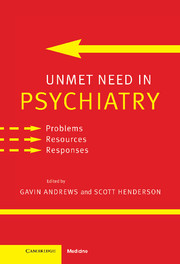Book contents
- Frontmatter
- Contents
- List of Contributors
- Preface
- Part I Unmet need: defining the problem
- Part II Unmet need: general problems and solutions
- Introduction
- 4 The epidemiology of mental disorder treatment need: community estimates of ‘medical necessity’
- 5 Some considerations in making resource allocation decisions for the treatment of psychiatric disorders
- 6 The need for psychiatric treatment in the general population
- 7 Comparing data on mental health service use between countries
- 8 The challenges of meeting the unmet need for treatment: economic perspectives
- 9 Unmet need for prevention
- 10 Meeting unmet needs: can evidence-based approaches help?
- 11 Unmet need for management of mental disorders in primary care
- 12 Is complementary medicine filling needs that could be met by orthodox medicine?
- Part III Unmet need: people with specific disorders
- Part IV Unmet need: specific issues
- Part V Unmet need: conclusion
- Index
12 - Is complementary medicine filling needs that could be met by orthodox medicine?
from Part II - Unmet need: general problems and solutions
Published online by Cambridge University Press: 21 August 2009
- Frontmatter
- Contents
- List of Contributors
- Preface
- Part I Unmet need: defining the problem
- Part II Unmet need: general problems and solutions
- Introduction
- 4 The epidemiology of mental disorder treatment need: community estimates of ‘medical necessity’
- 5 Some considerations in making resource allocation decisions for the treatment of psychiatric disorders
- 6 The need for psychiatric treatment in the general population
- 7 Comparing data on mental health service use between countries
- 8 The challenges of meeting the unmet need for treatment: economic perspectives
- 9 Unmet need for prevention
- 10 Meeting unmet needs: can evidence-based approaches help?
- 11 Unmet need for management of mental disorders in primary care
- 12 Is complementary medicine filling needs that could be met by orthodox medicine?
- Part III Unmet need: people with specific disorders
- Part IV Unmet need: specific issues
- Part V Unmet need: conclusion
- Index
Summary
Summary
Some aspects of complementary (or alternative) medicine are examined in the social and cultural settings of countries that also have an elaborate and widely available medical service based upon modern scientific medicine (called ‘orthodox’ medicine). It is often thought that complementary treatments can have a good effect, although brief, on almost anybody who uses them. It is also likely that persons with certain psychiatric disorders get a more lasting benefit from some types of complementary treatments, although not always for the reasons assumed by either the user or the therapist. As yet, no studies have been done to test these suggestions, but the case seems strong enough to justify the effort and expense of collaborative investigations. There is also a good case for regularly including some systematic information about complementary treatments in the curriculum of orthodox medical schools, rather than to continue the current practice of ignoring the subject.
Introduction
The results of recent surveys in Europe, the USA, and Australia show that complementary treatments must be providing something that is regarded as important by large sections of the adult population of those countries (Eisenberg et al., 1993; Fisher & Ward, 1994; MacLennan, Wilson & Tatlor, 1996; ‘Which?’, 1995). The findings are so striking and consistent that the orthodox medical profession would be well advised to try to assess how much the large and increasing industry of complementary medicine is meeting needs that could or should be met by orthodox medical services. For instance:
All the surveys agree that about one-half of the adult population uses complementary treatments at some time in their life, and that as many as one-third uses them repeatedly or even regularly.
Keywords
- Type
- Chapter
- Information
- Unmet Need in PsychiatryProblems, Resources, Responses, pp. 172 - 192Publisher: Cambridge University PressPrint publication year: 2000
- 1
- Cited by



